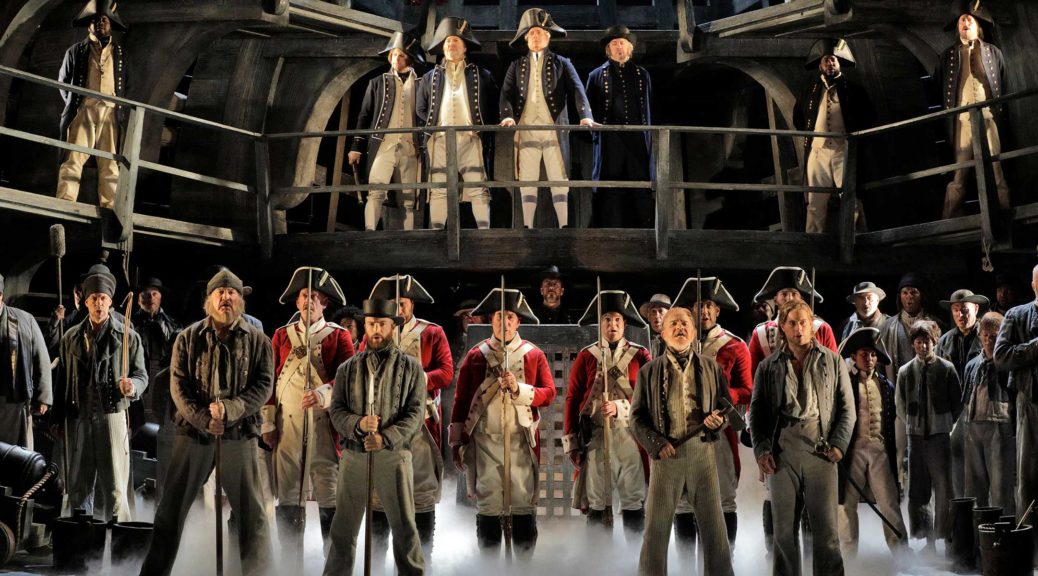
WARSHIP’S UNJUST JUSTICE
The unlikeliest hit opera: an immense all-male cast of 75; setting aboard a warship at sea, without touching land or engaging in battle; no dance, no festivities; and a severe tragedy with the ingratiating title character executed because of insane wartime regulations.
This is “Billy Budd” (1951), a searing bigger-than-life British drama (after Herman Melville’s virtually forgotten posthumous novella) which opened at the S.F. Opera Sept. 7. The neoclassical musical power of composer Benjamin Britten carries over past the voices to a brilliant orchestration, realized evocatively by Lawrence Renes and his pit orchestra—so nuanced, nimble and evocative in a hundred ways, bristling with leitmotives. This is operatic drama at its best.
But depressing it all is, as the title character is hanged because of an inflexible statute. The Satanic Master at Arms Claggart, torn by jealousy, picks as his nemesis the universally liked young sailor Billy Budd. He destroys him with the slanderous allegation that Billy was fomenting mutiny. When the frustrated Billy pushes him over, Claggart is killed in the fall. And Capt. Vere, a defender of Billy, is forced by Admiralty wartime regulations to counter the manslaughter with Billy’s execution. The unjust severity of letter-of-the-law still has lawyers debating the permissible-disobedience issue a century later.
The opera paints a stifling picture of iron discipline and whimsical floggings applied to impressed seamen who never intended to leave home. If the work is a tad leisurely in arriving at the tragic and inevitable execution, the S.F. Opera did what it could, telescoping the original four-act opera into having just one intermission. And the stage direction of Tony-winning Michael Grandage is so three-dimensional in its characterizations of the scraggly crew that you can almost smell the salt air on board. The efficient single-set design helps, but introduces flaws of its own. Notable of these is Capt. Vere giving orders from the “bridge” while actually far down in the bowels of the three-story set.
The cast came off well, even better dramatically than vocally, highlighted by tenor William Burden (Capt. Vere), baritone John Chest (title role) and basso Christian Van Horn (Claggart). The agonizing quandary of Vere, the focal figure from start to finish, drew in the audience. Meanwhile Chest was the nimblest of heroes, walking atop the railings and swinging from level to level. You’d have to look at Verdi’s Iago to find another epitomy of evil like this Claggart, voicing his own credo in malevolent fashion. And the crewman-chorus was stunning.
The libretto too is stunning, from the rich seafaring vocabulary to the symbolism, with Billy impressed from a merchant ship ironically called “The Rights of Man.”
Major opera companies in America from here to New York City are hurting financially, despite an orchestra seat running as high as $500 in some cases. But if all their productions came up to the level of this memorable “Billy Budd,” audiences would flock into opera houses once again.
MUSIC NOTES—The four Britten dramatic works likely to survive well into the future (apart from the comedy “Albert Herring,” in a category all its own) would comprise, I’d venture, the two sea-faring tales—”Peter Grimes” and this one—plus the chamber opera “Turn of the Screw” and the unique “War Requiem.” As a Londoner would say, there’ll always be a Britten!
Worth noting in “Billy Budd” are the covert gay allusions, with the title character called “baby boy” and “angel” by the seamen. In the 20th century when English gays were shunned, jailed and even had been forced into “corrective” medical treatments, Britten (himself gay) had to be cautious.
“Billy Budd” by Benjamin Britten, S.F. Opera, through Sept. 22. Three hours, one intermission. For SFO info: (415) 864-3330, or go online .